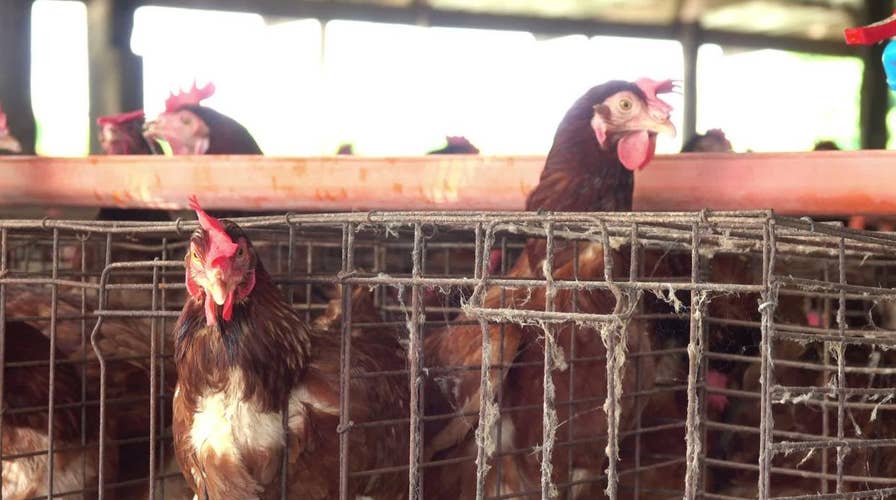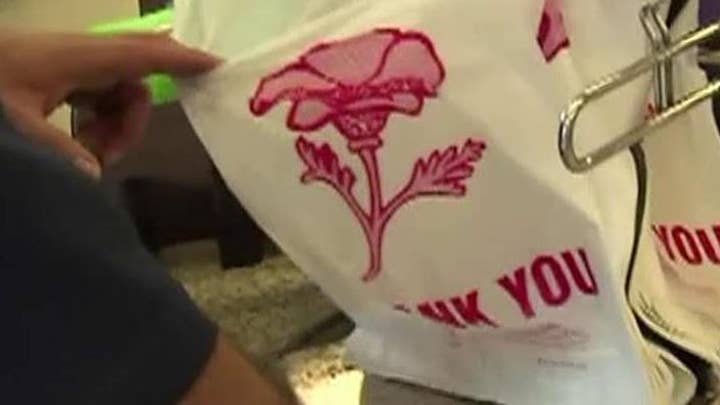California to vote on farm regulations
Californians will vote on proposition 12 in November. The measure imposes space requirements for farm animals.
A ballot measure in California next month is asking voters how they like their eggs.
The measure – known as Proposition 12 – wants Californians to decide whether to set new rules for the accommodations of egg-laying hens and other farm animals. The proposal would require the hens have at least one square foot of usable floor space by the end of 2019, be completely cage-free by the end of 2021, and eventually be provided scratching posts, nests and perches.
The Humane Society, which spearheaded the push for Proposition 12, argues that minimum space standards for the chickens – along with those for breeding pigs and calves raised for veal – would mark a huge step in animal welfare.
“This would be the most transformational step forward of all time in regards to animal protections,” Josh Balk, the vice president of farm animal protection at the Humane Society, told Fox News. “When you go down the street in California, do you think anyone would be against making sure these animals are not trapped in cages and unable to move?”
Proposition 12 builds on another ballot measure from 2008 that gave chickens, veal calves and pigs room to stretch, stand up, lie down and turn around in their cages by 2015. But the current measure up for a vote in November would go further by codifying the exact amount of space allotted to the animals and would ban the sale of any meat in California that does not meet these standards.
Along with egg-laying hens, calves raised for veal would be given 43 square feet of usable floor space, and breeding pigs would have 24 square feet.
While Proposition 12 enjoys broad support from a slew of animal protection groups, and from a number of lawmakers in the state, it has also made strange bedfellows of the organizations opposing the measure.
On one hand, groups like the Association of California Egg Farmers and the National Pork Producers Council have come out against the measure – arguing, among other things, that farmworkers are best fit to decide their own livestock practices and that Proposition 12 would put an undue financial burden on all taxpayers in the state.
The fiscal impact report, conducted by the California Legislative Analyst's Office, found that the measure would result in a potential decrease in state and local tax revenues of around a few million dollars annually and would cost the state up to $10 million annually to enforce. California’s budget for the fiscal year 2018-19 is $138.7 billion.
"Livestock production practices should be left to those who are most informed about animal care — farmers — and not animal rights activists,” Jim Monroe, spokesperson of the National Pork Producers Council, told the Los Angeles Times. “Additionally, changes in housing systems, which come with significant costs that increase food prices, should be driven by consumer purchasing decisions, not the agenda of any activist group.”
Some of those animal rights activists, however, are on the same side as the farmers when it comes to opposing Proposition 12.
More hardline animal rights groups like People for the Ethical Treatment of Animals, better known as PETA, say that the measure is a step backward at a time when more and more companies are already requiring hens to be cage-free amid a rising demand from consumers. The organization argues that the measure would only represent a small improvement over current conditions and misleads consumers who buy cage-free eggs into thinking they’re doing something humane for animals.
“PETA doesn’t sell animals short,” Ben Williamson, a spokesperson for PETA, told Fox News. “The Humane Society has a history of doing just that.”
Williamson said that if consumers actually want to help animals, the solution is simple: go vegan.
“The only way to break the cruelty of animals is to keep them off your plate,” Williamson said, promoting meat alternatives like vegan sausage and hamburgers. “You can do more good for animals by not eating them than by doing anything else.”
A recent report by the Plant Based Food Association, a trade group, found that plant-based food sales across the U.S. totaled more than $3.3 billion from June 2017 to June 2018, with sales in categories such as plant-based meat, cheese, and yogurt increasing by 24 percent, 43 percent and 55 percent, respectively.
The Humane Society’s Balk argues that PETA’s push for everyone to abandon eating meat and go vegan is unrealistic and out of touch with mainstream American thinking.
“PETA wants California to go egg free, not cage free,” Balk said. “But virtually every single animal protection group in the state is in agreement that Proposition 12 is a major step forward. PETA is the outlier here.”
Despite polling on the measure being scant, Balk is confident that the measure will pass easily come November given the previous support in 2008 for a similar imitative and a shift in consumer habits toward cage-free and free-range products.
“I’m very optimistic that this will pass overwhelmingly,” he said. “It won’t be a surprise.”
















































